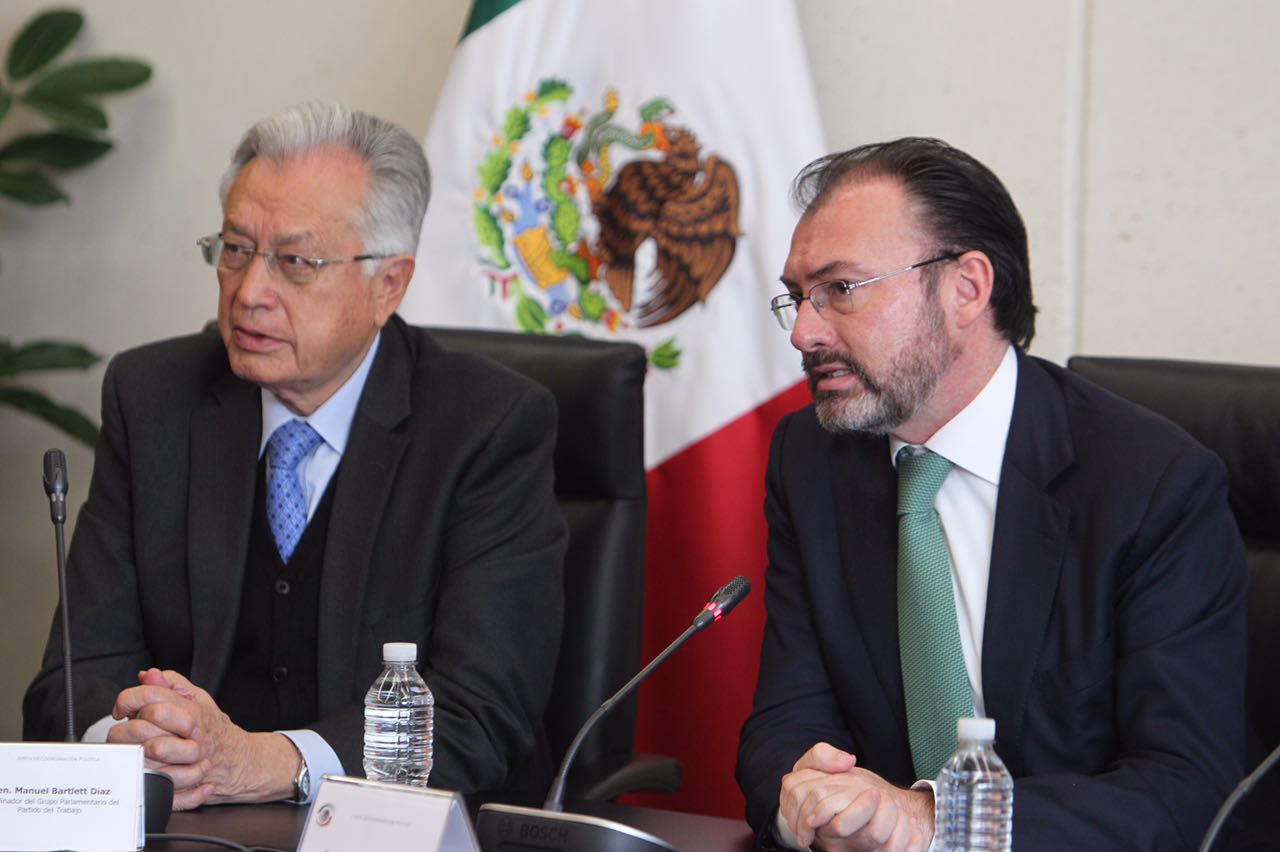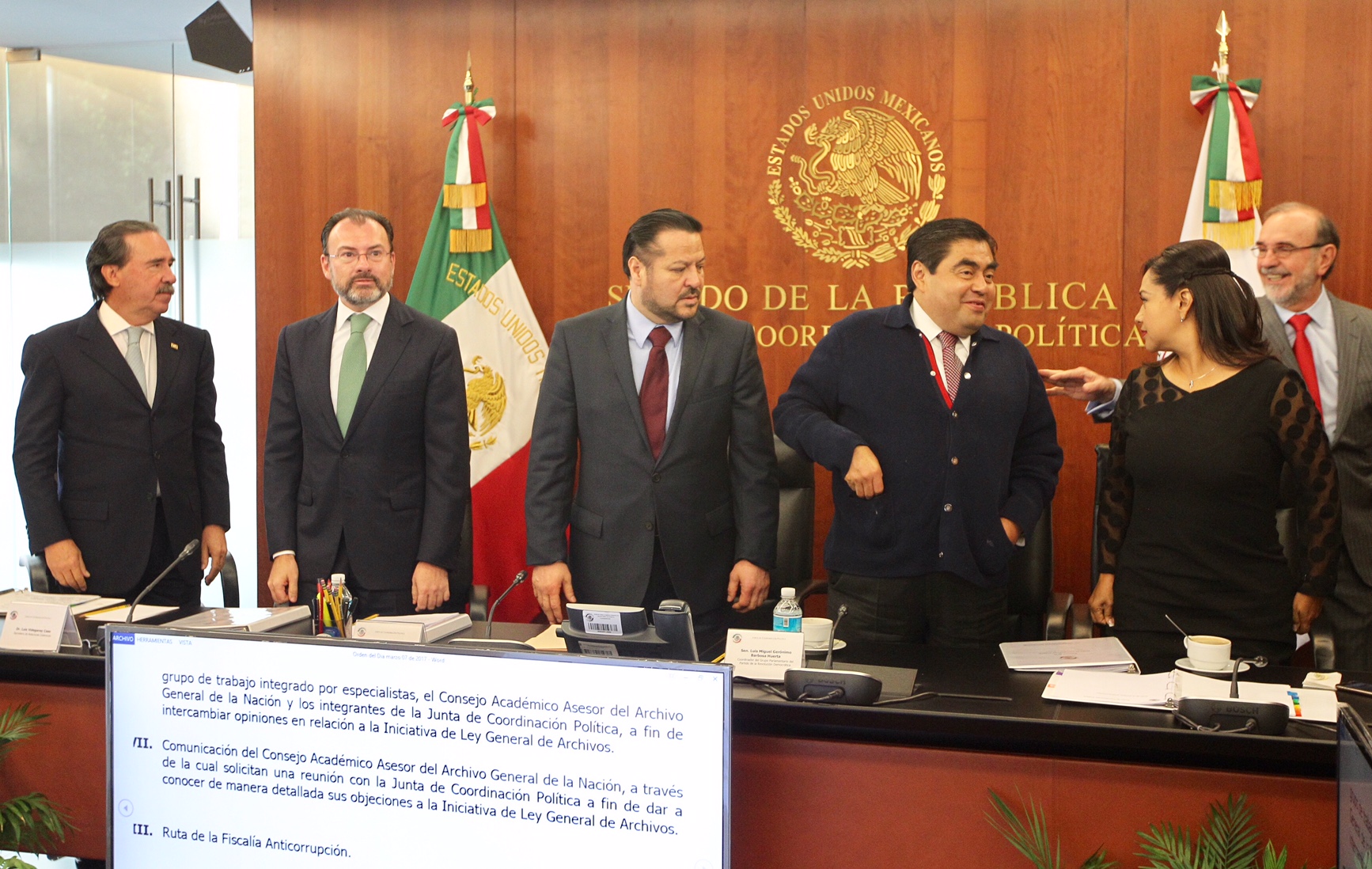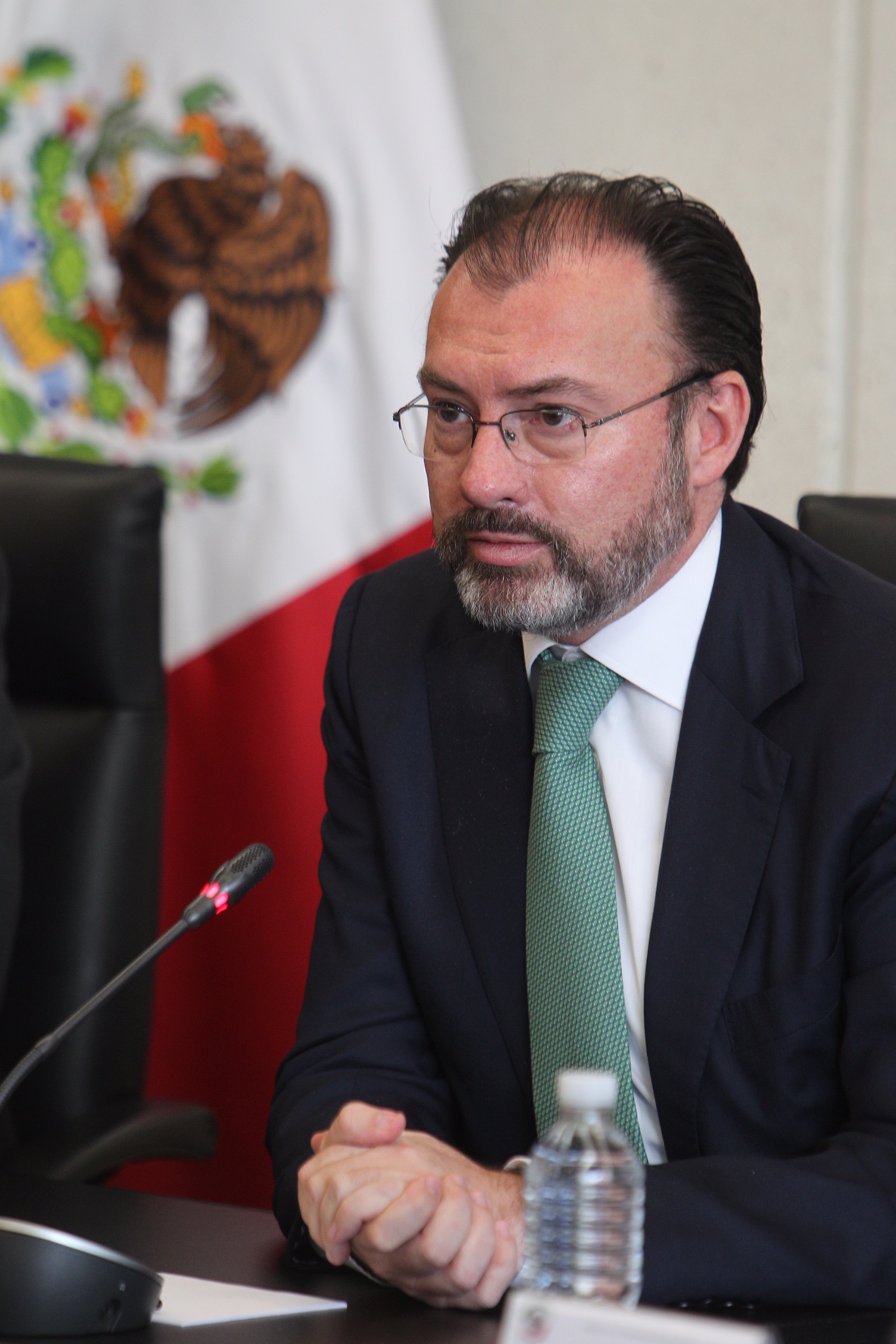The Foreign Secretary's remarks:
FOREIGN SECRETARY LUIS VIDEGARAY CASO: Thank you, Mr. Chairman.
I would like to thank the coordinators, as well as the chairpersons of the Foreign Relations and Foreign Relations for North America Committees, for being at this meeting, which is one more in the series of meetings we have had for the purpose of collaborating between the Foreign Ministry and the Senate.
The Senate is the constitutional body with the powers to analyze foreign policy and of course to ratify both the appointments of Mexico’s representatives abroad and Mexico’s international treaties with foreign countries. It is a vitally important collaboration and an ongoing one, and I welcome the existence of this dialogue, a very open and frequent one.
As Coordinator Herrera has already said, today we focused mainly on three themes:
First, we heard about the progress that has been made and the procedure that is under discussion in the Senate to define a legislative instrument that gives us a frame of reference with respect to the principles, specific objectives and limits of foreign policy, mainly regarding the relationship with the United States.
As we said at last week's hearing, this is clearly a very constructive exercise in which we take part enthusiastically, and we welcome the opportunity given to us by the Senate for a dialogue between the executive and legislative branches.
At the Senate’s suggestion, we have presented a proposal for some possible congressional trips that will have to be studied and decided on by the Senate. I would like to reiterate that all parliamentary contacts or visits by legislators abroad will always have the support of the Foreign Ministry. And we will follow closely the decision that is made about the specific proposals that we presented today to the Political Coordination Board.
Finally, on the last point, we have discussed the process by which Mexico’s ambassadors are appointed and ratified, noting that in the last 10 years there have been over 50 instances in which Mexican embassies have been without an ambassador for periods of more than six months. In some cases, the vacancies have lasted for over a year, and there are even a couple of cases where they have lasted for more than two years.
Therefore, the Foreign Ministry has carried out a review based on the Vienna Convention, which governs relations between countries, the 1964 Convention, and we have submitted a proposal to the Senate on how we could more quickly appoint ambassadors, always—and I repeat—always in strict adherence to the Constitution, the Constitutional powers of the Senate and the laws that govern these procedures.
I want to take advantage of the media’s presence to reiterate our appreciation to the Congress, and of course to the Senate, for the amendments made last year to the Foreign Service Law, article 44, which enabled us—on Friday of last week, in the consulate in New York—to issue the first birth certificate to a Mexican woman, a 17-year-old girl, who was born in Mexico and whose birth was not registered before emigrating to the United States, and who did not have any official ID.
This is a procedure that we have now put in place in all of the consulates and I would like to thank the Senate for its initiative, its leadership, in this area which, undoubtedly, in the current context, is a vital step in respecting the human rights of Mexicans, beginning with the right to identity.
That is all I wanted to say, Mr. Coordinator. Again, thank you for the opportunity to have a conversation with the Senate. It is a dialogue that will continue and I hope to be back very soon at a meeting with the Political Coordination Board or with whichever body the Senate deems appropriate.
Thank you.
REPORTER: Hello and good morning. I would like to ask the Chairman of the Coordination Board when the document will be ready? What is lacking? I would welcome your comments, and those of the Foreign Secretary. Do you think something is missing from the document you are preparing here, for which a draft version has already been drawn up?
And, basically, Mr. Secretary, I would like to ask you what the Mexican government’s position will be now that United States authorities have announced that they will be deporting Mexican mothers and separating families? Is there any way, or will the government seek before an international body to prevent this from happening? What measures you are preparing in case this policy is implemented?
FOREIGN SECRETARY LUIS VIDEGARAY CASO: On the legislative instrument, I have nothing to add to what the coordinator has already said.
Regarding your question about the announcement made by the U.S. Department of Homeland Security about the fact that they are studying the possibility of separating families the moment they enter the United States:
First, I would point out that this is not a definitive announcement; it’s something that has been mentioned as a possibility. We immediately informed the Department of Homeland Security about our deep concern if this were to happen, but it hasn’t yet. The Mexican government has stated its position clearly and in a timely fashion about our concern were this to occur, because of the irreversible damage this would cause within many Mexican families in this situation. And we hope that the opinion of the Mexican government will affect the decision that is finally taken by the United States government after having announced this worrying possibility.
REPORTER: Hello and good morning, Mr. Secretary. This question is for you: What response are you seeing to the legal defense centers in the Mexican consulates in the United States?
FOREIGN SECRETARY LUIS VIDEGARAY CASO: Thank you, Isabela. We officially opened the centers last Friday, but in fact the consulates have been working on this issue for some time.
The request for services or assistance ranges from basic questions to legal assistance and has increased noticeably, by about 400 percent if we compare the time period from January 20 to last week with the same period last year.
This means that there is huge concern on the part of the Mexican community abroad, and what we have been doing since we received additional budgetary resources to strengthen legal defense for Mexicans in our 50 consulates is precisely to provide these services. They range from providing correct information to, secondly, making an immigration diagnosis. That is to say that there are Mexicans who do not know for sure what their situation is and they are coming to the consulates so that they can quickly get a diagnosis and a specific recommendation about how to deal with their situation and how to proceed, from giving them legal defense hired by the Consulate itself or in coordination with various organizations.
There are very well known organizations with well-established track records with which we are teaming up and what we are doing is using these resources to strengthen where these organizations, with which we already have an established relationship, can give us a greater immediate impact.
Lastly, I want to point out that there are some cases that we consider to have a strategic or emblematic value that we address from Mexico City, because they are cases that could set precedents or even give rise to class actions.
These cases are given special attention because of their potential, again, to set precedents for future situations. And also, cases that could be a matter of legal action before international organizations: either the United Nations, or the Organization of American States. These cases also have the potential to give us a legitimate reason to go to these organizations. What we are doing is adapting to the needs and requests of the migrants.
And, finally, I would like to point out that in cases of repatriation we are assisting Mexicans to preserve their property, including real estate, financial assets and property such as vehicles. Many of the questions we are getting in, for example, the Foreign Ministry’s delegations, have to do with this, and we are also using part of our expanded budget to protect financial assets, for example.
It is a very wide range of activities, very intensive, that we are carrying out in the 50 consulates, in the mobile consulates and also with the help of the migrant shelters in various states in Mexico, with which we have already started working together. Thank you.
REPORTER: Mr. Secretary, as it is time to build, I have very good news: This morning, I was listening to a Chilean secretary of state, who said that conditions were favorable because now Mexico would turn and see them. How can this be capitalized on, Mr. Secretary? Will that happen?
FOREIGN SECRETARY LUIS VIDEGARAY CASO: As I said at last week's Senate hearing, the two most important foreign policy pillars are, first of all, to diversify our relations around the world, and this includes Latin America.
Mexico is a Latin American country. It always has been and will continue to be, because of history and culture and by conviction. In the particular case of Chile, we have a very intense relationship; we have a Free Trade Agreement, the second one that Mexico signed after the North American Treaty.
We are members of the Pacific Alliance and in the Pacific Alliance we will be working together with Chile, Peru and Colombia over the next few weeks in two main ways: First, on how to strengthen ties with other economies and the other countries of South America, particularly with Argentina, with Brazil and the MERCOSUR nations. And, on the other hand and after the cancellation of the TPP, how can we use the platform provided by the Pacific Alliance to strengthen economic and trade negotiations with Asia-Pacific countries?
We have a very broad agenda. We are currently negotiating free trade agreements with Argentina and Brazil, negotiations are under way and I believe that one of the most intense activities of Mexico's foreign policy, and also of the Economy Ministry, over the coming months will be to intensify not only our economic but also our political relationships with Latin America.
Thank you.


